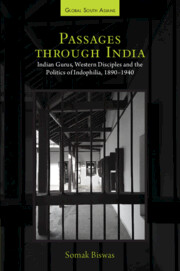3 - India, Indophiles and Indenture: Cultural Politics of a Transnational Discourse, 1911–1931
Published online by Cambridge University Press: 30 June 2023
Summary
This chapter examines how indenture became a site for Western disciples to merge their ideologies and intimacies, cultivated around the guru-figures of Gandhi, Gokhale and Tagore. It focuses primarily on the doings of three individuals in the campaign against indenture: the English-born Jewish lawyer/journalist Henry Polak, and the English missionaries C. F. Andrews and William Pearson. Inspired by their mentors, Western Indophile engagements with indenture affirmed their conviction to create a more egalitarian empire. At the same time, these relationships enacted notions of race, caste, class and gender as integral to the politics of respectability that preoccupied Indian nationalist discourse. Western Indophiles became useful interlocutors to ventriloquise nationalist priorities and their divergent trajectories. This is not to argue that Indophiles wilfully participated in a hegemonic schema designed by a cross-section of the Indian nationalist elite, but rather to underline that such politics and practices had distinct exclusionary effects, particularly for marginalised groups like Dalit women (and men) migrating to indentured colonies.
Introduction
The history of indenture is well-charted territory. The abolition of slavery across the British Empire in 1834 witnessed a massive surge in the demand for cheap labour. This was supplied from the Indian subcontinent, China and West Africa. Between 1834 and 1860, the British consensus for indenture was justified in the name of anti-slavery and free trade. This consensus posited indenture as civilising ‘primitive’ Indian labour and rescuing them from a life of poverty and caste atrocities. Liberal economic and demographic theories were invoked to argue that the supposed failures of slave emancipation could be corrected through the system of indenture. Indentured labour became a synonym for ‘free labour’, pitted against the unjustness of slave or ‘unfree’ labour. The scale of this regulated labour regime was vast, spreading rapidly across different imperial colonies.
Indian indentured labour was well integrated within this globally expanding labour market. Supplied through a system of recruiters, middlemen and government agents, labour from colonial India was eagerly sought by planters across the Indian Ocean littoral, starting with Mauritius, Fiji and South Africa, spreading significantly by the latter decades of the nineteenth century to East Africa.
- Type
- Chapter
- Information
- Passages through IndiaIndian Gurus, Western Disciples and the Politics of Indophilia, 1890–1940, pp. 117 - 152Publisher: Cambridge University PressPrint publication year: 2023

